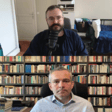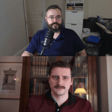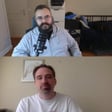Become a Creator today!Start creating today - Share your story with the world!
Start for free
00:00:00
00:00:01

Ep 31 - Noah Smith, "Noahpinion" - High-Skilled Immigration
Economist Noah Smith, author of the "Noahpinion" Substack, returns to the Sphere Podcast to debate high-skilled immigration with Sphere Media Publisher Pascal-Emmanuel Gobry.
Subscribe to the PolicySphere Morning Briefing: https://policysphere.com/subscribe
Noah's Substack: https://www.noahpinion.blog/
Subscribe to the Sphere Podcast on Apple Podcasts: https://podcasts.apple.com/us/podcast/sphere-podcast/id1780831168
Subscribe to the Sphere Podcast on Spotify: https://open.spotify.com/show/48eWEcxSYDyrgjC3lO0EJZ
Subscribe to the Sphere Podcast on YouTube: https://www.youtube.com/channel/UCB2gs2TBXeP7vyn9QUaaxjQ
Transcript
Introduction and Debate Setup
00:00:00
Pascal-Emmanuel Gobry
Hello everyone, and welcome to a new episode of the Low Production Value Sphere podcast, which is shot from my terrorist hideout in the tunnels underneath Gaza City, where it's suddenly very quiet.
00:00:13
Pascal-Emmanuel Gobry
ah And I have with me as my guest, again, Noah Smith.
Debating High-Skilled Immigration Policies
00:00:19
Pascal-Emmanuel Gobry
We had a first debate on immigration, and we spoke mostly about border stuff and mass immigration and so on and so forth.
00:00:27
Pascal-Emmanuel Gobry
ah But we thought we we didn't have time to talk about high-skilled immigration, so we thought we'd do a second debate just on high-skilled immigration. i will be defending, I guess, the position that America should...
00:00:41
Pascal-Emmanuel Gobry
significantly reduce the amount of so-called high-skilled immigrants that it takes in, and I guess Noah will defend the contrary. Noah, go ahead.
Benefits of High-Skilled Immigrants
00:00:51
Noah
Um, well, you know, interestingly, as I was just about to hop on this podcast, I came across a paper and, uh, and that paper shows that, um, uh, in the the U set immigration quotas, which effectively stopped scientists from immigrating from Eastern Southern Europe. The U S fell quickly fell behind in patenting and publishing in fields where these scientists worked.
00:01:15
Noah
And so, um, This is from Moser, Parsa and San, Immigration Innovation Lessons from the Quota Act. And so it occurs to me that America has always thrived on smart people coming here from other countries and inventing stuff, discovering stuff, basically doing smart people stuff.
00:01:38
Noah
And i can't think of a city in America that wouldn't benefit from an influx of smart people. I can't think of a state in America that wouldn't benefit from an influx of smart people.
00:01:49
Noah
So i'm wondering why America as a country won't benefit from an influx of smart people as well.
Current Immigration Policy Critique
00:01:57
Pascal-Emmanuel Gobry
Uh, okay. Uh, okay.
00:02:01
Noah
I mean, smart people are good, right?
00:02:01
Pascal-Emmanuel Gobry
Yeah,
00:02:02
Noah
Like smart people, you they produce a lot of economic value. they ah They, you know, start companies, employ people, invent stuff.
00:02:07
Pascal-Emmanuel Gobry
yeah, yeah. ah
00:02:13
Noah
Um, just produce a lot of money, pay, pay more in taxes than they take out. They like do fiscal support and like, you know, don't commit much crime at all. Um, you know, they're not going to like beat you up in the street and take your wallet.
00:02:29
Noah
Like, I don't really see where, where's the downside here.
00:02:31
Pascal-Emmanuel Gobry
Right.
00:02:34
Pascal-Emmanuel Gobry
Yeah, so, okay, so the the way I would frame things is, you know, the the famous joke, ah Winston Churchill asked this lady, would you sleep with me for a million pounds? And she said, yes. And he said, would you sleep with me for 10 pounds? And she said, Winston, what kind of woman do you take me for?
00:02:52
Pascal-Emmanuel Gobry
And he said, well, we've already established what kind of woman you are. Now we're just haggling over price. And so when it comes to high-skilled immigration, don't... i don't And I don't know anybody ah who supports zero high-skilled immigration.
00:03:10
Pascal-Emmanuel Gobry
right we're We're all just haggling over price. Yeah,
00:03:14
Noah
All right. Well, let's haggle. what's ah where So where's the downside?
00:03:17
Pascal-Emmanuel Gobry
yeah, yeah. So I would say the the price is too high now.
00:03:20
Noah
Where do we have... what i'm what i'm saying is What I'm saying is, at some point, if you just... You're like, okay, well, smart people, good. Well, let's take some more. Well, okay, that was good. Let's take some more. And then you you keep going up and up.
00:03:33
Noah
And at some point, you start running into some sort of problem. And what is the problem that you start running into in your assessment?
00:03:42
Pascal-Emmanuel Gobry
Yeah, so i would I would say a couple things. First of all, ah smart people is is a great thing, but you have to be realistic vis-a-vis ah the actually existing state capacity of the American government.
00:03:59
Pascal-Emmanuel Gobry
And so if you look at – you know if What I would love is for America to run sort of Operation Paperclip indefinitely, to have like really smart people whose job is to like identify the brightest people around the world and like get them to be like ah like an executive search firm.
00:04:18
Noah
and recruit them. Indeed.
00:04:20
Pascal-Emmanuel Gobry
and be like, come to America, we'll give you the green card right away. We'll set you up with a job at MIT or at Google or whatever, blah, blah, blah, and take in 1,000, 10,000 people ah year that way that would be wonderful The American government
Tech Industry and Visa Misuse
00:04:36
Noah
the
00:04:36
Pascal-Emmanuel Gobry
as it currently exists cannot, you know, I i wouldn't trust any organization set up within the current American government to actually do that effectively.
00:04:49
Pascal-Emmanuel Gobry
And so if you look at the existing high skilled immigration ah visas in the US, they're kind of a joke. H1B is the most famous one and the majority of visas granted under H1B are granted to Indian outsourcing firms.
00:05:04
Pascal-Emmanuel Gobry
who ah that essentially, there there are not in fact importing sort of innovators. They're importing 85 grand a year Excel monkeys whose job literally is to just replace American workers and like do the same job for lower for lower wages.
00:05:22
Pascal-Emmanuel Gobry
ah That is ah very unhealthy thing. The O-1 visa, which is supposed to be the Einstein visa, it's hard to say, but like it's you know ah certainly if you talk to a lot of people who like received an O-1 visa, a lot of them will tell you it's a joke.
00:05:41
Pascal-Emmanuel Gobry
ah One ex example... One example is Milo Yiannoupolos, who you know i like ah personally, but ah if you know who that is, that is the right-wing provocateur.
00:05:55
Pascal-Emmanuel Gobry
ah He's British, and he lives in the US because he received an OWN visa as like an individual of extraordinary ability. ah There was this famous thread that went viral ah by this like Indian Silicon Valley VC it like that was like a guide to O-1 visas. And basically, so you know one way you demonstrate extraordinary ability is by having publications.
00:06:16
Pascal-Emmanuel Gobry
And so there are basically lots of fraudulent...
00:06:21
Pascal-Emmanuel Gobry
ah pseudo you know journals where you can just pay to have like fake papers written and published under your name. So these things are being gamed, and these things are being gamed because they're run by a not very competent ah government. The laws were poorly written, and they're being poorly implemented.
00:06:43
Pascal-Emmanuel Gobry
ah So that's that's the situation we're dealing with, and I would say that when you have high-skilled immigration that is that reaches a certain threshold, and again, we can debate what that threshold is, but that's the question you asked, like what's the bad thing that happens when you have lots and lots of smart people coming in?
00:07:02
Pascal-Emmanuel Gobry
ah Well, if you look at tech, for example, um
00:07:08
Pascal-Emmanuel Gobry
The tech companies have been bringing down wages and tech. There was a very good piece in The Atlantic, believe it or not, a few years back. on it It was called like the myth of tech worker shortage. like If you talk to anybody in Silicon Valley, they'll oh, we have a shortage of tech workers. And if you look at the ah the evidence, it's totally not true.
00:07:27
Pascal-Emmanuel Gobry
ah Tech wages are right now going down because of ai like The idea that you would want to make tech less attractive as a sector, that this is good for innovation,
00:07:40
Pascal-Emmanuel Gobry
um it is is not a good idea in my mind. i mean you know The perverse effects of... so-called high-skilled immigration is the same thing with like Chinese grad students.
00:07:52
Pascal-Emmanuel Gobry
ah shi you know it's It's not their fault. ah Chinese citizens come to the US.
00:07:57
Noah
So let me, there but let's, let's. like Okay.
00:08:00
Pascal-Emmanuel Gobry
Before they come, they get an interview with the Ministry of State Security, with their which is their KGB, and they're told that they should do their patriotic duty and report on everything that happens.
00:08:06
Noah
All
00:08:10
Noah
all right, hold on.
00:08:10
Pascal-Emmanuel Gobry
And if they don't, their family might run into problems. And like the list of like Chinese spying scandals
00:08:14
Noah
Right.
00:08:17
Pascal-Emmanuel Gobry
It's like, and again, I'm not being bigoted.
00:08:20
Noah
Let me slow you down here because we've, we've got to,
00:08:21
Pascal-Emmanuel Gobry
I'm i'm telling you it's not your fault, but that's just the reality.
00:08:24
Noah
We've got quite a lot of points and I'm worried that the listeners may get really lost.
00:08:24
Pascal-Emmanuel Gobry
Yeah, OK, go ahead. Yeah, yeah. OK.
00:08:29
Noah
um So let's ah let's let's set aside the Chinese spying thing for right now. And let's talk about, let's let's go back to the first thing you're talking about, because I thought that was really interesting and and we just kind of ah dropped it a little bit, ah which was the idea that the problem with high skilled immigration is ah we're not getting high enough skilled immigrants with our purportedly high skilled immigration programs.
00:08:53
Pascal-Emmanuel Gobry
Right.
00:08:53
Noah
And to paraphrase, I think what you're saying is that our quote unquote high skilled immigration programs are not actually the real thing. They're fake,
Universities and Global Talent Acquisition
00:09:04
Noah
too fake or too much of them, let's say some some of them is real, but too much of them is fake.
00:09:04
Pascal-Emmanuel Gobry
Yeah.
00:09:07
Pascal-Emmanuel Gobry
Yes.
00:09:08
Noah
There's too much fake high skilled immigration.
00:09:08
Pascal-Emmanuel Gobry
Yes. Correct.
00:09:10
Noah
Things that are procedurally or named high skilled immigration are actually just a coat of paint on a rotten interior. um And so that's a that's a big issue.
00:09:21
Pascal-Emmanuel Gobry
That is my position.
00:09:23
Noah
Right. So I, but the thing is that to some degree, i share this because, you know, the, the Indian outsourcing firms, ah you know, basically um hogging H and, and, and effectively gaming the H1B visa for, you know, immigrants that are really mid-skilled immigrants, I'd say, you know, these, these are, these are people who could be like, you know,
00:09:38
Pascal-Emmanuel Gobry
Yeah.
00:09:45
Pascal-Emmanuel Gobry
Right.
00:09:49
Noah
line engineers at like a widget factory, but they're not going to like discover the cure for cancer.
00:09:53
Pascal-Emmanuel Gobry
Right. Right.
00:09:55
Noah
Right.
00:09:55
Pascal-Emmanuel Gobry
right
00:09:56
Noah
And then couple of things about this. Number one, um we actually do have an operation paperclip that has been going on since that time and has been extremely successful.
00:10:08
Noah
um And that was what's called university search committees. And
00:10:13
Pascal-Emmanuel Gobry
and Okay.
00:10:14
Noah
um What that is, is that you so university search committees go find the the smartest people from around the world and ah bring them here. So you'll notice that ah ah frenchmen just one the Frenchman living in France just won a Nobel Prize. That was pretty cool.
00:10:32
Noah
um However, ah other Europeans, and then then the european European government is like wow, someone from Europe won a Nobel Prize. Well, plenty of people from Europe win Nobel Prizes. They just win them in America.
00:10:44
Pascal-Emmanuel Gobry
Yeah.
00:10:44
Noah
Because university search committees paperclip them here.
00:10:49
Noah
And this happens for physics, you know, that's like, like half the Japanese Nobel Prize winners live in America. You know, and if you're going to move from Japan to America, that's impressive.
00:11:00
Noah
Like Japan is nice. I've lived there. And it it takes a lot to get Japanese people to want to uproot and move to America.
00:11:02
Pascal-Emmanuel Gobry
Yeah.
00:11:07
Noah
And yet somehow university search committees do it.
00:11:07
Pascal-Emmanuel Gobry
Right.
00:11:11
Noah
And so if you just look at where all this like all the most brilliant like people move, it's to American universities or was traditionally. and so they act And often those people are on H-1B.
00:11:20
Pascal-Emmanuel Gobry
Yeah.
00:11:25
Noah
And universities are exempt from the cap. um
00:11:27
Pascal-Emmanuel Gobry
Yes.
00:11:28
Noah
so So when you look at Indian outsourcers as a, you know, how much of the cap, ah the 85,000 cap they get, that denominator does not actually include universities, which, um and so so the universities are using the H-1B, the uncapped ah part of the H-1B program to basically get all the top profs in the world as an operation paperclip.
00:11:36
Pascal-Emmanuel Gobry
Right.
00:11:40
Pascal-Emmanuel Gobry
Yes, correct.
00:11:52
Noah
And so I think that's not popularly understood. Like people don't know that's happening. And so i want I want people to know that that's happening and that that the real talent pipeline for the top, most you know, most brilliant people in the world is universities.
00:12:08
Noah
And um their kids become a bunch of like top company founders, by the way. ah you know, their their their kids go get rich ah because they're like, well, you know, dad had a job and as a prof, you know, and discovered all these famous things, but I'm going to go get rich.
00:12:13
Pascal-Emmanuel Gobry
Right.
00:12:23
Noah
So, you know, for example, my ah my friend Steph Sher is a VC. And um I don't know if you met her at the the conference, but um anyway,
00:12:36
Noah
she was around. But anyway, her parents worked for Bell Labs. That's where they met. They were Taiwanese. They were brought to work at Bell Labs. They discovered some interesting, important stuff. um Bell Labs is not a university, but it functioned sort of as a university back in the day. And um you know then their kid you know went and got rich in the tech industry and is now a VC and all this stuff like that. So that's the typical pipeline.
00:12:58
Noah
And um we focus so much on those Indian outsourcers. And I agree. that's you know that they They are gaming the system and they and it's not too hard to shut them down. Um, but you just, you just implement a minimum salary or, or salary cap or like, or you can auction H1Bs actually. So the, the capped H1Bs, you can actually auction them.
00:13:17
Noah
And so the people who are willing to pay the most for H1Bs end up, um, uh, uh, you know, the people basically wage equals marginal productivity, blah, blah, blah. Markets do your thing.
00:13:30
Noah
And so then the Indian outsourcers just go poof. And so that's yeah easy fix. um And in fact, we didn't.
00:13:55
Noah
But I mean, immigration advocates have proposed. Like William Kerr has been advocating this for decades.
00:14:03
Noah
Right. So it's like William Kerr has been advocating this for decades. Like William Kerr has been saying,
H1B Visas as Trial for Green Cards
00:14:07
Noah
you know, we need to do like salary minimum salaries for the H1B. He's like the number one economist proponent of high skilled immigration.
00:14:16
Noah
um High skilled immigration is not really like a lefty issue. Like you don't, you find very few lefties who talk about it or who care about it. um it was It was traditionally like a center-right sort of thing, like a Mitt Romney sort of thing. And now like some, you know, center-left like abundance type people have gotten on the, hopped on the train.
00:14:34
Noah
But traditionally it was a centrist technocratic idea of we need smart people to power growth, but the lefties don't care about growth.
00:14:43
Noah
It was.
00:15:12
Noah
Right. And so what I'm what i'm saying is, but but we're not just tackling over price. We've got to have an accurate picture of what our current programs are doing, I think. We've got to, you know, if we misunderstand what the current programs are doing, then we may not think clearly about how to improve them.
00:15:28
Noah
and And I think that the role of universities in bringing all these like extremely top people here with the H-1B shouldn't be forgotten. We can't forget that, that that's what we're doing. And if we were to say end the H-1B program or bring universities under the cap or make it harder for the spouses of those top people to work, you know, when in America or all those things, that hurts the most effective part of the H-1B visa.
00:16:47
Noah
So smart people and mediocre people leave academia.
00:19:22
Noah
Yeah, we you're you're you're right. I mean, our universities still do a pretty good job of getting the best and brightest people, but that doesn't mean that you know everyone that the universities are getting is the best and the brightest.
00:19:37
Noah
In terms of um you know your typical you know your typical like, you know, interpretive dance professor, like how many of those are they hiring? The answer is, is actually less and less. So humanities hiring has, has cratered and soft social science hiring like sociology, anthropology has actually gone way down over time as a percent of university hires.
00:19:57
Noah
Like STEM has actually been increasing that, you know, then you have to also factor in the idea that, ah you know, the the hypothesis that the quality of STEM hires have been going down.
00:20:10
Noah
I actually submit that the quality of STEM hires has been about steady because you've got this big exit of STEM hires to the tech industry. ah You can go make so much money in tech. Like i make five times as much money as a blogger as I could as ah as like a top professor.
00:20:27
Noah
Like not maybe not top professor, but close close to the top. Like if I had gotten tenure at Stony Brook and then trans and then like then gotten hired at a good school like UCLA or something like that, I probably make you know, yeah, five times what I would have made with that career path, a very successful academic career path in economics, which has paid more, a lot more than other disciplines.
00:20:50
Noah
And so that's as a blogger, i I type little articles about, you know, explaining economics to lay people and make five times as much as like a really good academic economist at UCLA would make.
00:21:02
Noah
And like, yeah, like I can, you know, there's a couple of professors in the world who get paid more than me. Like, um, And so, and of course, if you're in the tech industry, this is the salary of a mid-level manager, right? And so the the the brain trust that's been built in tech, you can go work for just like fucking Google and be a Google, you know, senior director at Google and make like twice as much money as I make.
00:21:26
Noah
And like, that's crazy. Or maybe a Facebook, let's say. And that's crazy. Like that has drained a lot of the native born, ah you know,
00:21:37
Noah
people from academia, even the people who are not into taking risk, you know, famously academia ah grabs low risk people, but those people can really go and and and work for Google and Facebook. And how high risk is that? Really?
00:21:49
Noah
You're becoming, it's ah it's a brain trust. And so universities have been replacing those people as they leave, not replacing them forcibly in the sense of a great replacement where they're pushed out, but replacing them opportunistically, desperately, because the smart domestic native-born people are leaving for Google and Facebook and hedge funds.
00:22:08
Noah
As that has happened, the universities have been like, where are we going to get geniuses? Well, India and China. And that's where we get our geniuses who can't who whose language skills and human networks and, you know, whatever are not don't allow them to, like, ah get jobs at, you know, ah director jobs at Facebook. Maybe they could be at a lower level engineer at Facebook, but who want that? That would be way below their talent level. They're fucking absolute geniuses who actually do discover new stuff.
00:22:37
Noah
So universities are replacing ah You know, as as the the native born Smarties leave, the universities replace them with foreign born Smarties who are equivalently smart. so I think the quality of STEM has been about the same and the the volume of STEM within the university has grown as the sort of interpretive dance professors have been kind of like starved for funding.
00:22:58
Noah
Like all those departments are dying. No one wants to major in that shit.
00:23:05
Noah
Cratering.
00:23:12
Noah
no Yeah. and And of course it's right. You're not wrong. Like obviously i think universities in the sixties did a remarkably bad job of allocating funding to departments. They thought that, you know, social psychology was going to be just as useful as like physics. So they were just like, here's a department, here's a department, we'll give you all sort of equal money.
00:23:30
Noah
And then, um, Now they're like, OK, so some of these things actually help grow, you know, make more money than other things. And so we should allocate more resources to them. And then the undergrads vote with their feet. You know, they they major they're like they flooded into like CS majors and stuff like that.
00:23:46
Noah
ah Maybe maybe over flooded into CS majors recently. But but but in general, this has been a healthy trend of of undergrads leaving the useless majors and just no understanding that not all diplomas are created equal.
00:23:59
Noah
and going to the the more useful majors like STEM. And this has resulted in greater STEM hiring as a percentage of total. And um where are you gonna get all those STEM professors? You're not gonna get them domestically because domestically you can go make five times as much working for Google.
00:24:13
Noah
You gotta get them from foreign lands. And then you get them from foreign lands, they start on the H-1B. They don't stay on the H-1B obviously, like but they start there. I mean, Elon, so so the other thing about H-1B specifically, this program, is that what I think people don't understand is that H-1B is actually a non-immigrant visa.
00:24:33
Noah
And H-1B is a trial period where we temporarily hire people to see if we wanna give them an employment-based green card. Our actual high-skilled immigration program in America is the employment-based green card created in 1965.
00:24:48
Noah
um And this is ah you know basically H-1B says, you come, you work here for a few years and we see if you're worth a green card. And then if you are, it's a dual intent and so uh it's a trial period it's a trial period and so like and so if we um if we thought experiment if we didn't have h1b we still have all those employment based green cards which are our true high skilled immigration program to america um o1 is tiny it's nothing o1 is like nothing compared to the eb the eb is our true is our true high skilled immigration program the green card and so
00:25:24
Noah
Like, 01 is nothing compared to it. And like, if 01 is, by the by the way, for the listeners, 01 is a little special because you can renew it infinite times. So it ends up being sort of like, it's it's actual immigration disguised as a visa.
00:25:38
Noah
um But EB is just much more important. Like, no one stays on 01 for like 20 years. they They go to EB. And so... um So the question is, how would we get our EBS if we didn't have H-1Bs as a trial period? We'd have to hire we'd have to cold hire from overseas. that's And then you get lower quality.
00:25:59
Noah
And so the H-1B ends up being this trial period for our true high-skilled immigration program. And the EB, I would say, i don't want to rattle on too long here, but the EB is a market-based high-skilled immigration program.
00:26:12
Noah
It is not like... It's not regained by the Indian outsourcing firms. All right.
00:26:27
Noah
It's a green card, not a visa. It's actual immigration. You're you're a permanent resident.
00:26:43
Noah
There is one for supermodels. We import the hot Brazilians. Thank you.
00:26:52
Noah
We're just draining Brazil's talent.
00:26:56
Noah
Brain drain, meat, butt drain. Anyway.
00:29:10
Noah
Right. So the thing about EB, though, is it's ah it's a market test, right? It's like, um you know, EB is not. so So people talk about H1Bs being like tethered to their jobs or whatever, but EBs are not, right?
00:29:24
Noah
You hire someone on EB, they can switch jobs tomorrow costlessly and get any job they want, start a company, do anything. They're permanent residents. They're done. So If you have a company and it's expensive to sponsor run for someone for an EB and it takes a little while.
00:29:39
Noah
So if a company gets an EB, whether they hire them from overseas or they hire them from the current H1B pool, which is like a trial pool, if they do that, they are, they're putting their money where their mouth is and they're making a ah market bet that this person is not just good, but we'll stick, you know, we'll stick with them for enough of a time to justify their investment.
00:30:02
Noah
And so, the all all the problems that people have with H1B are not present with EB, like none of them, like the outsourcing shit and the like, and the, um you know, the the tethering to an employer.
00:30:17
Noah
but where But what I'm saying is that, is that then you have to hire a site on scene from overseas for EBs and you're going to get lower quality.
00:30:31
Noah
Well, suppose I'm, Suppose I'm like a tech company and I want to hire some like and I want some, so you know, sponsor people for some EBS. OK, want to become the employment sponsor for people for to get employment based green cards for my company, you know, so they can work at my company.
00:30:46
Noah
There's, you know, in a world with H1B, what I say is, OK, well, here's these H1B people who are already working here. I know how I have some idea how good they are because I've seen some of their performance. Let me sponsor them to become EBs.
00:30:58
Noah
You know, they've been here for a couple of years. It's trial period. Without H-1B, what I then have to do is I then have to say, okay, I'm going to go to India. I'm going to send some dudes to India to recruit. And I'm going to try to figure out from these Indians working in Indian jobs, who's good to hire and bring overseas.
00:31:17
Noah
That's shitty. That is like, you're going to get a much worse crop of people for EBs.
00:31:25
Noah
But no, i mean, but you're still going like we're still going to hire up to the cap of EBS. Right. But we're going because, you know, we have big tech industry and we have big knowledge industries and that's what our country runs on. And the EBS, there's actually not enough of them.
00:31:41
Noah
We should have a lot more. But the point is that um you're actually going to get lower quality because you're going to sponsor people for EBS who then turn out not to work out. You're going to lay them off. And then they're just going to running around America, low quality, you know, low quality mishires.
00:31:57
Noah
And so the H1B,
00:32:01
Noah
then we get rid of EB. You're just, i think this is a salute. This is a You've got a policy in search of a justification and the policy is to is to kick out high skilled immigrants from America.
00:32:13
Noah
You're you're looking around, looking at these programs, you know, seeing or imagining some of the faults in these programs and then just saying, get rid of this thing, get rid of this thing. you're, you're, it's teleological. You've, you've decided that high-skilled immigrants are bad and you're, you're looking for flaws in programs to justify the prearranged goal, the predetermined goal of kicking them out.
00:32:35
Noah
And I don't think that makes sense.
00:32:41
Noah
What would you call that? What's what's what's a thing where you you decide your, I know it's not teleological in the logic sense, in the form of logic sense, but what's the thing where you decide your goal and then you go around looking for support from that goal? What's ah what's a common use word for that?
00:32:55
Noah
All right, motivated reasoning. So yeah, so motivated, I think this feels like motivated reasoning. This feels like, um
00:33:03
Noah
it feels it feels like we're starting from the idea that we've got too many high-skilled immigrants in America and we need to get rid of some of them. And I, I, I challenged this idea. I say, why?
00:33:16
Noah
i think there's a, I think you've got a reason in the back of your head and I think we haven't got to it yet.
00:33:25
Noah
Sure.
00:33:35
Noah
Yes.
00:33:43
Noah
Well, wait.
00:33:51
Noah
You got it right the first time. Wait, the cool in my social circle doesn't matter because like, obviously I don't give a shit about that because, but the the people who bring in people who are like me, you're absolutely right.
00:34:04
Noah
Like, I think people like me are kind of good. I want more of them. And that's not a way that a lot of people think because a lot of people think, well, people like me are going to compete with me.
00:34:15
Noah
They're going to take my niche. They're going to, you know, they're going outcompete me and then I won't be special. I won't have a job. They'll take my job. I don't think like that. I'm a zero. I'm a positive something or not a zero something. And I think if we bring in more people like me, it'll be good for the country. Like, of course, I want more people like me.
00:34:31
Noah
Otherwise, i would think, wow, I suck. I should be a different kind of person.
00:34:37
Noah
You know, I want more people like me here. that it's not That's not a hidden agenda. That's an open agenda. I think people like me, you know, if maybe if everyone was like me, it would be a problem.
00:34:49
Noah
But the number of people like me are actually kind of few in America. I'm kind of, you know, my my culture is kind of a a small minority of people who just like to, you know, like sit around be nerds. Like there's not enough nerds in America.
00:35:04
Noah
I want more. This country isn't nerdy enough. I like nerds. I make no secret about that. I want more nerds in this country. i you know, and, and, and I don't think, you know, like I'm not a rootless cosmopolitan myself. I am a a rooted cosmopolitan and um I am a rooted cosmopolitan. I value place very highly.
00:35:30
Noah
and yet I want ideas from everywhere. And, um you know, I, that's That is why we have the internet. um But then, you know, like, like it and, but but I'm not getting enough good ideas, you know, like, like, going in and going on Japanese websites and living in Japan is different, right?
00:35:50
Noah
hang out with Japanese people, very different. So the internet is good, but it's not good enough and not nearly good enough. And so I want more nerds for America. not and And, you know, like, it
Cultural and Economic Impact of Immigration
00:36:02
Noah
you know, I'm a little past caring about this at this point in life, but but I want more nerds to date.
00:36:07
Noah
You know, like, like nerdy guys should want more nerdy girls to date. And, um and ah there's a whole world full of nerds out there. And, you know, if you're, if you're going on dates, and, you know, maybe girls don't want to talk about like the latest AI model and make some sort of slop with you.
00:36:27
Noah
Well, then maybe some some girl from Korea will. want to do that and we'll be interested in that. some you know So get some nerds. I don't see what's wrong with that. like you know like um Where am I going wrong with this?
00:37:08
Noah
me Wait, they had a big thing like like revealing his real name so he can... I can't pronounce it. I can't pronounce it. We can just say J. Okay.
00:37:24
Noah
All right, all right. We can say Krem. He's Krem.
00:38:39
Noah
White people. We're discriminating against white people. Smart white kid from the Midwest comes up and and they're like, no, sorry, we're full. No more whites.
00:38:49
Noah
Yeah. That has been true in the last few years, but um you know that's true basically since 2020. There's been a lot of that. Before that, there was maybe a little bit of it, but like if you were really smart, it wouldn't like make that big of a difference.
00:39:04
Noah
And
00:39:07
Noah
But the point is that a couple of things. Number one, this, this IQ difference between the States has been true for a long time. And it like a very long time and long before like DEI and all that shit, you know, what happened.
00:39:22
Noah
um And so you still had this effect in 1980. No, no.
00:39:33
Noah
no yeah
00:39:38
Noah
Right. So first, right. So first, let me say, i think that that's a bad thing and that that discriminating against white people is bad.
00:39:49
Noah
It's also illegal. And you're going to see a lot of lawsuits that smack it down in the near future. And SCOTUS will smack it down everywhere they can. um But, you know, you have tacit discrimination. It's hard to smack down, as we've seen in the past. But that aside, so that's that's bad.
00:40:06
Noah
But also, you know, like, I, you know, i'm I'm Jewish, at least of Jewish descent, and my ancestors got sort of discriminated against so occasionally, formally, often informally in like the in like the the early to mid 20th century, up through like the 50s. I think after the 50s, it kind of went away.
00:40:27
Noah
But then like, um but yeah, so so they got discriminated against. And yet somehow they ended up succeeding in spite of that. And I think that while discrimination against white people is bad and we should get rid of it, and we are going to get rid of it, we're not going to get rid of it, but we're going to smack a lot of it down through the courts.
00:40:47
Noah
um I think that um ah you can't keep smart people down completely. You can keep them down a little bit, but you can't keep them down completely. And smart smart will shine through. And that's true of Midwesternism.
00:41:47
Noah
So.
00:42:34
Noah
I want to come back to that because i think that's really important. So, but go on. Yeah, sorry.
00:44:15
Noah
right
00:44:29
Noah
Right.
00:44:43
Noah
And it will also off-frame more, by the way.
00:44:48
Noah
Yeah, you can you can put a research center overseas and, I mean, we can, you know, then we can try to make policies to stop that. And then we kill supply chains and then our country gets poorer.
00:45:00
Noah
Anyway. All right. I want to go back to the thing you said. You said that elites don't represent the people. People feel alienated from their elites. um First of all, I suspect that this is at the core of the opposition to high-skilled immigration.
00:45:17
Noah
The idea that by bringing the smartest people from India, China and whatnot, we are importing people who don't care about the average American, whose affinity for the average American is low.
00:45:33
Noah
And we are breeding, we are not breeding, but importing, let's say, a class of disconnected elites who don't care about the average American and worsening the divide between elite and regular Americans.
00:45:45
Noah
i think When I hear concerns about high-skilled immigration, I think that's what's actually the concern. The concern about low-value Indian outsourcers is who cares?
00:45:56
Noah
No one gives a fuck. That doesn't affect you. It doesn't affect anyone. I don't think anyone gives a fuck about because it because it never affects anybody. like Nobody ever sees like those those outsourcing people, but what they do see is this divide between elites
00:46:58
Noah
But what what American... yeah look Look, man. Nah. No American...
00:47:17
Noah
these are both These are both foreigners to you. You're not American.
00:47:23
Noah
Why, you know, like, you are one in many... When we're talking about rootless cosmopolitans, people who have you know transnational ideological identifications, we're talking about you more than me. Because I'm sitting here in America from my country thinking about policy from my own country based on the people I know who all live here and the places that I'm rooted to, while you are foreign smart guy sitting in a foreign country thinking about what my country ought to do
00:47:55
Noah
based on ideology. And so when we're talking about, root you know, don't, this doesn't invalidate any of your points and this doesn't mean you're wrong about anything and and or that I'm right about anything. This isn't a dunk or a gotcha.
00:48:06
Noah
I'm just saying we should, we should note that, ah you you know, you're in this, at least in the context of this discussion, you're much more of a rootless cosmopolitan than I am. I'm speaking my native language.
00:48:20
Noah
You know, I'm speaking my native language and living in my native country here, thinking about, know.
00:48:35
Noah
Fair. yeah It's also an American tradition though. So it's a great American tradition is smugly telling everyone else what to do. um Anyway, but back to back to the point, I think that who um the divide between elite Americans and regular Americans comes from ah two things, mainly.
00:49:00
Noah
Number one, it comes from geography. The fact that we had these superstar cities and universities where we concentrated the nerds. where they don't have to interact with the regular kids. And in fact, the regular, like the average people beat them up in high school.
00:49:14
Noah
And then instead of learning to get along with the people who beat them up in high school, they simply fled from the people who beat them up in high school and went to the coasts or to universities or places where the high school people wouldn't beat them up anymore.
00:49:28
Noah
Right? And then, um ah and I think that's part of it. is that is mobility, is sorting, self-sorting. And that comes from that comes from our economy, which is the second part of this.
00:49:42
Noah
America stopped being the world's factory and we started being the world's research park. ah We switched to knowledge-intensive, human capital-intensive industries where it what it we didn't have a choice.
00:49:56
Noah
we don't have the We don't have the domestic market size to be the world's factory anymore. So there were mistakes made along the way, I'm not going to argue. But if you draw a circle where all the people live, If you draw a circle, all the people live, they live in Asia, and it was inevitable that production, you know, mass mass labor intensive production will go to where the people are.
00:50:16
Noah
That was always going to happen whether or not America closed its borders or not closed, you know, tariff. We could have made tariffs a billion percent. And yet the world market's much bigger than the American market. And this was always going to happen.
00:50:27
Noah
we specialized in knowledge industries because inevitable economic global economic forces pushed us toward it but because of that a collateral a piece of collateral damage from that shift was that um you know an unwanted externality was that we we concentrated our economically productive forces in superstar cities like san francisco and new york and la and dc and seattle and austin and miami and blah blah blah we concentrated the economic production there so that everyone else is left behind. And the smart people don't, you know, nerds in San Francisco don't have the interests of rural Iowans or small town Iowans, let's say, and or or people in Western Michigan in their, you know, they don't have their interests at heart because they're not there.
00:51:14
Noah
Because all the, you know, like the forces of cluster, of industrial clustering are like, which you can read about in Enrico Moretti's book, um The New Geography of Jobs. These forces are like vast forces that are really hard to resist.
00:51:27
Noah
And we didn't we didn't create a mechanism. we We did create, we did have a mechanism for nerds to live around normies. And that mechanism is called land grant universities.
00:51:38
Noah
So some, a few smart people will go out to like, you know, Western Kentucky is like Pikeville University, right? You've never heard of it, but ah you should if you read Lyman Stone.
00:51:48
Noah
He writes about it. But then um there's a lot of little universities like that, right? My dad, smart guy from St. Louis, went to work in in Texas A&M in College Station, Texas, right? And he has friends who are normies and he likes things that, you know, normies can relate to, such as grilling beer and driving a Ford Mustang.
00:52:09
Noah
And then like, you know, he is our, our, RJ, I can say, are i have my my my family are the very rare Hick Jews whose ancestors were actually allowed to own land in Lithuania. So they became Hicks and were like village blacksmiths. That's why my name is Smith.
00:52:25
Noah
I'm a descendant of actual village blacksmiths. And so therefore, my aunt my my dad's family came to America and some of them immediately became hillbillies. And like, you're like, really? Hillbillies? And yes, I have a like second cousin who died of a parasitic infection from walking barefoot in the Ozarks.
00:52:47
Noah
That's a real hillbilly. So anyway, but so that's just my family. You know, we are we are traditionally like people of the land and we have that instinct where, you know, but. um But I'm saying that this, the you know, if my dad could have gotten a job in New York City, I would have been raised as a very annoying New York kid.
00:53:08
Noah
And i'm I thank God every day that I was not raised in New York, you know, so that I don't become one of those, well, this city's okay, but New York is better. You know, one of those guys. I don't want to be one of those guys. I'm glad I'm not.
00:53:20
Noah
Sorry, New Yorkers. Also, your pizza sucks. But then um your trains are too loud. Your your convenience stores aren't labeled. your The facades of your buildings look like slaughterhouses from 1910, and you need to up your game.
00:53:33
Noah
It's the one big, dense city we've got. um Anyway, but the point is that we have some mechanisms for dispersing the smart people, but we need more. And yet, if you look at who is advocating that, you see guys like Ro Khanna, Indian American, born here, but um has this deeply uncomfortable with the idea that smart people are isolated on the coasts.
00:53:58
Noah
in these coastal cities. You see guys like Roy Bahat, venture capitalist, my friend, you know, um Israeli, deeply uncomfortable with the idea that smart people are not people of the land.
00:54:10
Noah
The people are most comfortable with it are the white people from the Midwest who escape. Selection effect, right? The people who, like, if you look
00:54:21
Noah
Yeah, they you talk to Mark Andreessen, who grew up in like, you know, small town Wisconsin. No one has more negative things to say about small town Wisconsin white people than Mark Andreessen. Like, it's it's those Midwestern white people who escape who really, you know, who like...
Integration of Immigrants into American Elites
00:54:43
Noah
Honestly, the people who are the, the, the smart people who are the most people of the land are like Indian and Chinese and Korean people who go to those little universities out in like Indiana or Kentucky or whatever, and work at those little universities.
00:54:58
Noah
Those, those, those are the people holding it down for our country and connecting elites with the common people. It's those immigrants.
00:55:08
Noah
Cause we have such great geographic mobility. I don't.
00:55:57
Noah
Yes, I don't think it has to be. I think, in fact, it should be. Increasing high skilled immigration should be part of that compact.
00:56:08
Noah
Because if you look at. The last time we had such a compact in was in the 1940s, right? It was called the World War Two.
00:56:18
Noah
It was at the GI Bill. It was called the Army and. We had a large entry of high skilled immigrants into the American elite, not just Jews. I mean, Jews are the most famous, but they're actually small in number. It was actually mostly just like East and South Europeans. It was a bunch of like Polish people and Greek people and stuff like that. Those people actually outno write those people actually outnumber Jews in the elite, even though Jews are disproportionate.
00:56:44
Noah
but um But so it was all those those the the new you know white ethnics got incorporated into the American elite at that time. And then after that, we had during the Cold War, we had like Taiwanese people, Vietnamese people, Korean people, all these people who were sort of high skilled but displaced from, ah well Vietnamese people tended not to be high skilled, but then Korean people certainly.
00:57:09
Noah
um And a lot of a lot of countries, the high skilled people displaced by the Cold War, anti-communist types came to America, Cuba. And then so um a lot of those those elites came to to America and were incorporated into the American elite.
00:57:23
Noah
um often becoming pretty conservative, honestly. But then, um although grandkids, whatever, they're just fully assimilated. But then, um but they but they often became pretty conservative. And that is beside the point. I guess the point is that this worked, this system worked.
00:57:40
Noah
And if we're going to look at what has worked in America, we instead, we should think about making everyone join the army. We shouldn't be thinking about restricting immigration is not going mix our people.
00:57:54
Noah
Yes, join the damn army, because if we restrict high-skilled immigration, the smart white people from the Midwest are still going to just leave for the freaking coasts.
00:58:17
Noah
It did, you know, go on.
00:59:11
Noah
Okay, but remember that that population is, most of that is not high-skilled.
00:59:19
Noah
So if you're talking about percentages of population and all that stuff, we're back to our previous podcast about mass immigration. The high-skilled immigrants are, you know, they're like a quarter, a fifth of that, maybe a fifth.
00:59:34
Noah
And like, I would like, you know, why not increase that percentage?
00:59:45
Noah
the
00:59:50
Noah
People are afraid of
01:00:06
Noah
But why does America.
01:00:10
Noah
Why does America so strongly support high skilled immigration in like polls?
01:00:19
Noah
It's really strong and bipartisan, too. And when you say like mass immigration, poor people, the support isn't very high. But when you say high skilled immigration, everybody likes it. And and like Americans want it.
01:00:31
Noah
Americans like it. They say they like it. You know, the the movement against like anti. No, no, but but why are you why do you want to go against the wishes of the American people who would like to see it increased?
01:00:46
Noah
i America is on my side. The the the silent major majority is on my side here. I feel like i'm I'm taking a popular position, not necessarily a populist position, because the people who are activists are not necessarily the same as the silent majority.
01:00:59
Noah
But I'm taking a popular position. Americans agree with me and not with you on this. Every poll says it's overwhelming. It's not like 55, 45 either.
01:01:10
Noah
It's like they agree with me and the questions are clear.
01:02:37
Noah
I would also say that's bad though. I mean, like I, a strong and consistent supporter of increased high-sealed immigration, would also say that what you just said is bad.
01:03:06
Noah
but that but we have But we know that foreign students subsidize Native-born Americans, allowing them to be charged lower tuition. we We selectively discriminate in favor of citizens.
01:03:20
Noah
we We know that foreign students reduce tuition from Native-born American students. They subsidize them.
01:03:35
Noah
It does. We have papers. There's papers on this. I'll send a paper. But yeah, no, I mean, and everyone knows it at the universities, too. They're like the foreign students are cash cows, you know, so we can educate the local people. Everyone at the universities just wants to educate the local people, but they need money. And after the Great Recession, states turned off the funding taps.
01:03:54
Noah
And, you know, ah
01:03:59
Noah
they I mean, they really do like they're not in it for the money, man. University people aren't in it for the cash, dude. They're in it for the the mission. and Like, and administrators aren't even in it for the intellectual prestige. They're not, administrators don't even give a shit about intellectual prestige.
01:04:15
Noah
They're in it for the mission. They are NGO people.
01:04:21
Noah
Well, anyway, all right, we got to go.
01:04:31
Noah
My final statement is that although i think high-skilled immigration has gone great for America every time we've done it, is necessary for the American economy, and is healthy and good for American society, I do have a slight worry about foreign intellectuals coming to America and you know um using applying foreign ideas to American policy and social debates and telling us what to do without having the needed local context.
01:04:58
Noah
And so occasionally i debate them on podcasts.
01:05:17
Noah
for blogging
01:05:36
Noah
you too man until next time



















